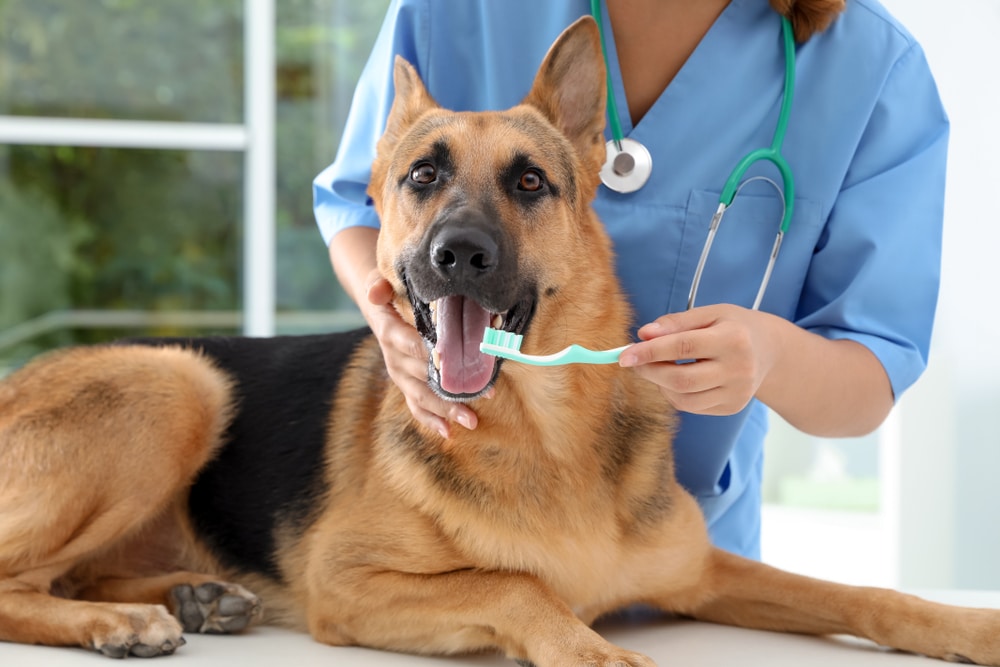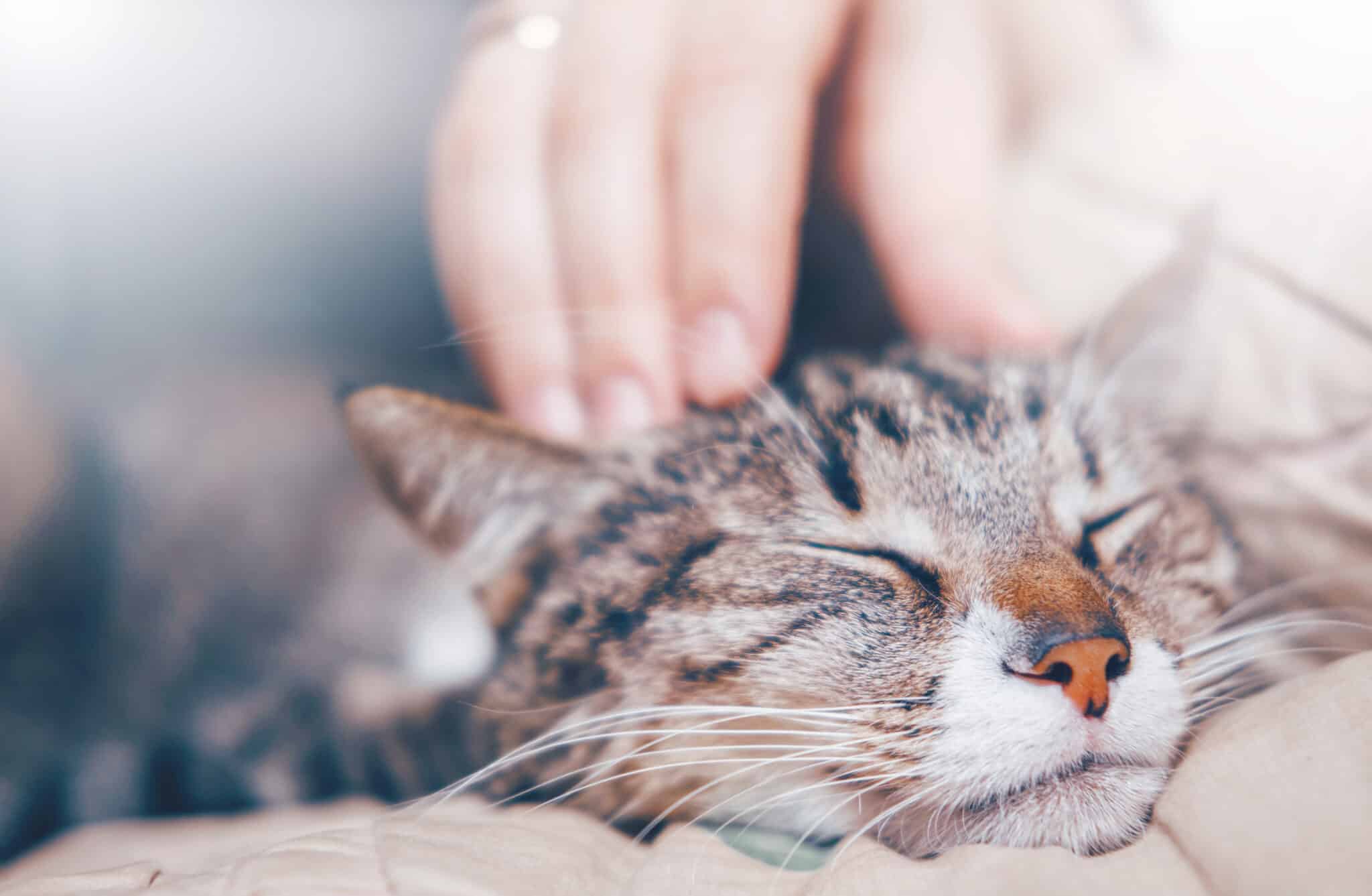What Does Pet Dental Insurance Cover?
Pet dental insurance coverage can be divided into two categories: dental accidents and dental illnesses. Dental accidents are injuries to your pet’s teeth, such as chipping or losing a tooth. These types of incidents are usually covered like any other injury under an accident-only or accident-and-illness policy. As long as the damage resulted from an accident and was not pre-existing, most pet insurance companies will cover the resulting care.
Dental illnesses include diseases that impact your pet’s oral health, such as cavities and gum disease. Because dental diseases are common in dogs and cats, providers typically limit coverage and impose special conditions on covered care.
You may encounter policies with stricter sub-limits on annual payouts, age caps for eligibility or that only cover some teeth in your pet’s mouth. Each policy can differ significantly, so it is best to check with your insurer for more details.
Dental pet insurance usually covers procedures such as:
- Broken, chipped or fractured teeth
- Crowns
- Gingivitis and periodontitis
- Root canals
- Stomatitis
- Tooth extractions
What Is Not Typically Covered?
Pet insurers typically do not cover pre-existing conditions — so if your pet has a dental issue before you enroll in coverage, it would not be covered. Additionally, insurance providers commonly exclude the following treatments and conditions:
- Cosmetic dentistry
- Fillings
- Implants
- Pet orthodontics
- Routine dental cleanings
- Tools or supplies for at-home or routine dental care
Insurance providers may also put eligibility requirements or specific coverage limits on covered dental procedures.
Although teeth cleaning isn’t covered by pet insurance, some pet wellness plans typically offer coverage on dental cleanings. Some pet insurance companies that cover dental cleanings through preventive care are Lemonade‘s Preventative Care+ plan and ASPCA Pet Health Insurance‘s Basic Preventative Care plan.
Most Common Dental Issues in Pets
Dental issues are common in cats and dogs. In fact, 80% of dogs and 70% of cats develop periodontal illness by two years old.
The Cost of Pet Dental Issues
Treatment for pet dental problems varies in cost depending on the severity of the issue, pet species and breed, etc. According to Carecredit, the average costs range from $50 to $300. The table below breaks down the cost of common dental treatments for pets.
| Dental Issue | Treatment Cost |
|---|---|
| Periodontal disease | $400-$1,000 |
| Abscessed teeth | $200-$500 |
| Root Canal | $200-$3000 |
| Malocclusions (misaligned teeth) | $200-$1,000 |
| Gingivitis (inflammation of the gums) | $300-$700 |
| Tooth loss | $200-$500 |
| Jaw fractures | $1,000-$3,000 |
| Oral trauma | $200-$500 |
| Abscessed teeth | $200-$500 |
| Tooth fractures | $200-$500 |
How To Find Affordable Pet Dental Insurance
Most pet insurance companies do not include dental coverage in their most basic plan. Instead, providers may offer dental care through a more comprehensive top-tier plan, a dental coverage add-on or a preventative care plan.
- The top-tier pet insurance plan is the policy with the most comprehensive coverage, but it’s also typically the most expensive. This plan would typically cover any dental diseases or dental accidents.
- A dental coverage add-on is sometimes offered instead of including coverage in a standard or routine care plan. For example, Lemonade offers dental illness coverage for an additional $13 per month, which covers illnesses like gum disease or stomatitis.
- A preventative care plan is typically an add-on option pet owners can pay for in addition to their base policy. This plan typically covers routine dental work, such as teeth cleaning and plaque removal.
Pet Dental Insurance Waiting Periods
All pet insurance companies require a waiting period before coverage will kick in. If your pet is in a dental accident or develops a dental illness before the waiting period is over, it will not be covered.
Here are the waiting periods for dental illness and accidents for popular pet insurance companies:
| Company | Dental Accidents | Dental Illnesses |
| AKC | 2 days | 14 days |
| Allstate | 2 days | 14 days |
| ASPCA | 14 days | 14 days |
| Chewy | 5 days | 14 days |
| Costco | 1 day | 14 days |
| Embrace | 2 days | 14 days |
| Fetch | Up to 15 days | Up to 15 days |
| Figo | 1 day | 14 days |
| Geico | Up to 5 days | Up to 30 days |
| Healthy Paws | Up to 15 days | Up to 15 days |
| Lemonade | Up to 2 days | 14 days |
| ManyPets | 15 days | 15 days |
| MetLife | 1 day | 14 days |
| Nationwide | 14 days | 14 days |
| Odie | 2 days | 14 days |
| Petco | Up to 15 days | Up to 15 days |
| Pets Best | 3 days | 14 days |
| Progressive | 3 days | 14 days |
| Prudent Pet | 5 days | 14 days |
| Pumpkin | 14 days | 14 days |
| Spot | 14 days | 14 days |
| State Farm | 5 days | 30 days |
| Trupanion | 5 days | 30 days |
| USAA | 2 days | 14 days |
| Wagmo | Up to 15 days | Up to 15 days |
Top Pet Dental Insurance Companies
Many pet insurance providers offer dental coverage that ranges from cleanings to tooth extractions and dental and gum illnesses. We reviewed the following pet insurance providers to see how coverage offerings compare for dental accidents, illnesses and preventive treatments.
Lemonade
Lemonade offers affordable pet insurance, costing $33 per month for dogs and $22 per month for cats on average. Dental coverage is available with two add-ons: The Preventative+ wellness plan covers routine dental cleanings, dental X-rays, anesthesia and teeth polishing, while a separate add-on covers certain dental treatments, such as gum disease and tooth extraction.
- Dental coverage requirements: Must submit pet medical records, pets must be 14 years old or younger, must live in a covered state*
- Coverage options: Standard accident and illness plan, Preventative Care plan, Preventative+ plan, add-ons
- What’s not covered: Pre-existing conditions, bilateral conditions, preventable conditions, experimental treatments
- Waiting period: Two days for accidents*, 14 days for illnesses, 30 days for orthopedic conditions in some states
*Lemonade may offer shorter accident waiting periods depending on where you live.
To learn more: Lemonade Pet Insurance review
*Unavailable in Alaska, Delaware, Florida, Hawaii, Idaho, Kansas, Kentucky, Louisiana, Maine, Minnesota, South Dakota, Vermont, West Virginia and Wyoming
Fetch Pet Insurance
Fetch’s accident and illness policy covers dental illnesses and injuries, including reimbursement for gum disease care, prescription medications and supplements, emergency vet visits, surgeries and X-rays. Additionally, coverage for extractions, periodontal disease and endodontic treatments extends to all of your pet’s adult teeth, not just its canines. Monthly premiums for Fetch’s highly comprehensive coverage average around $103 for dogs and cats.
- Dental coverage requirements: Must submit medical records
- Coverage options: Standard accident and illness plan
- What’s not covered: Pre-existing conditions, routine dental cleanings and preventive care, prescription food, any issues before the waiting period ends, claims filed more than 90 days after treatment
- Waiting period: Up to 14 days
To learn more: Fetch Pet Insurance review
Spot Pet Insurance
Spot’s standard accident and illness plan covers dental accidents and illnesses and averages $85 per month for dogs and $38 per month for cats. However, you’ll need to add a preventive plan to receive coverage for things like routine dental cleanings. Spot’s Gold plan allots $100 for dental cleanings per year, while the Platinum plan offers $150 per year.
- Dental coverage requirements: Must submit medical records, pets must be at least 8 weeks old
- Coverage options: Standard accident and illness plan, Gold Preventive Care plan, Platinum Preventive Care plan
- What’s not covered: Pre-existing conditions, boarding and daycare, elective or cosmetic procedures, supplements and vitamins, any illness or injury resulting from intentional or negligent actions
- Waiting period: 14 days
To learn more: Spot Pet Insurance review
ASPCA Pet Health Insurance
ASPCA Pet Health Insurance covers dental disease and injury under its standard accident and illness plan, but the plan does not include preventative care services like dental cleanings. However, ASPCA Pet Health Insurance covers dental cleanings under its preventative care add-on. Average monthly premiums are $46 for dogs and $19 for cats.
- Dental coverage requirements: Must submit medical records, pets must be a minimum of 8 weeks old
- Coverage options: Standard accident and illness plan, accident-only plan, add-on preventative care coverage
- What’s not covered: Routine dental cleanings and preventative care (in the standard plan), cosmetic procedures, pre-existing conditions, breeding costs
- Waiting period: 14 days
To learn more: ASPCA Pet Health Insurance review
Healthy Paws
Healthy Paws offers one comprehensive accident-and-illness pet insurance policy with no annual payout limitations. It’s not as cheap as Lemonade, but it offers unlimited dental coverage. It covers dental needs related to accidents and injuries, such as tooth reconstruction and extraction. Monthly premiums average $57.55 for dogs and $25.23 for cats.
- Dental coverage requirements: Must submit medical records; pets 5 years old and under must have had a vet exam within 12 months before or within first 15 days of policy; pets 6 years old and over must have had a vet exam within 30 days before or within first 15 days of policy
- Coverage options: Standard accident-and-illness plan
- What’s not covered: Pre-existing conditions, exam fees, elective procedures, boarding fees, routine dental cleanings, parasite control, vaccinations
- Waiting period: 15-days
To learn more: Healthy Paws Pet Insurance review
Figo
Figo covers dental illnesses and injuries under its standard plan and offers additional coverage through add-ons. The Wellness add-on provides money back for exams, vaccines and other routine care. The Vet Exam add-on provides coverage for exam or consultation fees associated with the diagnosis and treatment of your pet beyond preventive care. Figo’s standard plan costs an average of $54 per month for dogs and $26 for cats.
- Dental coverage requirements: Must submit medical records, pets must be a minimum of 8 weeks old
- Coverage options: Standard accident and illness plan, add-ons for wellness coverage and vet exam fee coverage
- What’s not covered: Pre-existing conditions, experimental procedures, cosmetic surgery, routine dental cleanings and preventive care under the standard plan
- Waiting period: One day for accidents and injuries, 14 days for illnesses
To learn more: Figo Pet Insurance review
Embrace
Embrace offers one pet insurance plan that covers both accidents and illnesses, including dental-related incidents. This includes tooth repair, extractions and treatment up to $1,000 per policy year for dental diseases. This plan costs $73 monthly for dogs and $39 monthly for cats on average.
- Dental coverage requirements: Must submit medical records, pets must be 14 and under for accident-related coverage
- Coverage options: Standard accident and illness plan
- What’s not covered: Pre-existing conditions in the last 12 months, deliberate injury or illness due to neglect, cosmetic procedures, routine care
- Waiting period: Two days for accidents, 14 days for illnesses
To learn more: Embrace Pet Insurance review
Cost of Pet Insurance with Dental Coverage
Accident-illness plans range from $15 to $90 per month, averaging $66 a month for dogs and $32 a month for cats. Dental illness and accidents are typically included in the cost, but be sure to check your contract for exact coverages.
Dog teeth cleaning costs are typically an add-on option through the provider’s wellness plan.
The chart below displays the average cost of pet insurance for 11 providers based on over 1,400 quotes.
Is Pet Dental Insurance Worth It?
Dental problems like periodontal disease and teeth fractures can cause chronic pain, excessive drooling, swollen gums and more in pets. Pet dental insurance can help you be prepared for the financial burden of emergency vet care for dental issues. Adding a preventative care plan improves your chances of avoiding these health conditions in the first place.
According to NAPHIA, the average pet owner spends $584 per year on dog insurance and $343 on cat insurance. According to Spot, a tooth extraction could cost between $1,000 and $3,000 for dogs and $300 to $1,300 for cats.
Without insurance, you’re left to pay the full procedure cost out of pocket, but if the claim is covered by an insurance provider with an 80% reimbursement rate, you’d pay $200 to $600 for dogs and $60 to $260 for cats.
If you add the cost of your annual pet insurance premium to your portion of the covered tooth extraction claim, you’d pay up to $1,184 for a dog and $603 for a cat. That is a significant savings over the out-of-pocket treatment cost.
Note that preventative care, such as teeth cleaning, is not covered by pet insurance but may be included in a wellness policy.

Frequently Asked Questions About Pet Dental Insurance
Unlike insurance policies for humans, pet dental insurance policies typically allow you to see any licensed veterinarian. Some companies may reduce your reimbursement for visiting certain specialists. See providers’ policy details for specifics.
Most providers require you to submit your pet’s medical records so they can determine preexisting conditions. Some require you to submit medical records for only a particular period, often 12 months.
Whether a veterinary exam is required to enroll in a pet insurance policy depends on the provider. If you can’t provide medical records, the provider may require an examination by a licensed vet at the time of the policy enrollment date. Providers may also use the first documented veterinary exam after enrollment to determine preexisting conditions.
Pet dental insurance typically doesn’t cover teeth cleaning, at least not in the standard accident-and-illness plan. Some providers offer coverage add-ons for preventive dental care so your pet can get dental cleanings and routine exams. Others see dental cleanings as an expected expense and one you don’t need insurance to cover, so they don’t provide coverage options.
Yes, we think that dog dental insurance is worth it. Many dogs will face some form of dental illness during their lives, which can be painful for your pet and expensive to treat. Investing in the oral health of your pet can give you peace of mind that your dog may avoid dental disease and you may avoid resulting vet expenses.























